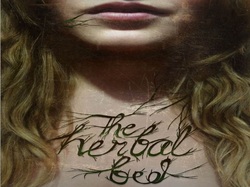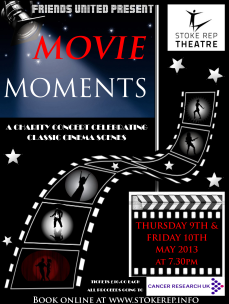|
Well my first play premiered this last weekend and it was a great success. A few bewildered faces at the complexity of the material have shown where my revisions lie, but it was still very well received by the audiences.
A huge thank you goes out to the cast, the crew and everyone who has helped out, but especially to Tim Churchill for his great directing and to Phil Kempson of C M Productions for producing the piece. Below is the review for you to peruse through at leisure, unfortunately it is not online so i have had to write it here instead of posting the link, luckily it is in the local paper. Thanks again!! "Potteries writer and actor Steven Beattie has created a remarkable piece of theatre inspired by the life and work of American author Edgar Allan Poe. The 19th Century author was famous in his lifetime, and his life and work have remained prominent from that time throughout popular culture in literature, music, films and television. Poe was a poet, journalist, editor and literary critic, but he is best known for his tales of mystery and horror. Invisible Tears cleverly weaves together all these aspects of Poe’s life and work by using the writer at his desk as a framework for some spell-binding story-telling. The curtain opens to reveal a set which perfectly complements the largely dark and serious subject matter: subdued lighting on sparse and sombre furnishings, dark walls and the distant view of an empty attic space. Music and sound effects are well chosen throughout. Poe is a soul tormented by illness in mind and body, by separating from his sick wife, then grief at her death, neglect by an uncaring public and money troubles. He medicates himself with alcohol, and is driven always to write. James Freeman gives a fine performance, effectively expressing Poe’s despair and pain, sometimes quietly and sometimes with passion, and he displays intense listening skills and superb interaction with the characters in his stories. The first story is the most difficult: a lecture by the Devil on consuming bodies and souls of philosophers, ancient classical writers and historical figures, interspersed by the sneezes and hiccups of French chef Pierre Bon-Bon proved somewhat challenging. After that, the stories of mysterious death, murder and of the fear of being buried alive are balanced by an unexpected change of tone as Rob Lawton gives a delightfully camp telling of the story of the Dutch borough of Vondervottimittis, where the inhabitants are sealed off from the world in a valley where the only objects they know are clocks and cabbages. The eleven actors are uniformly excellent, drawing the spectator into the lives of Poe’s characters, who have an urgent need to tell their stories and to be understood. There were two occasions when the level of emotion displayed undermined the clarity and power of the story, namely during the latter part of The Tell-Tale Heart and in the delivery of Poe’s most famous poem, The Raven. Those moments apart, Tim Churchill’s direction is pitch-perfect, achieving a skilful balance between stillness and movement, calm and powerful emotion, contemplation and sudden activity. This production deserves to be seen more widely, and I hope very much that it is. Diana Lane"
0 Comments
'Phantom of the Opera', written by Gaston Leroux, is a peculiar literary classic. It was serialised in 1910 and then published in volume form in April 1910 (in English in 1911), and is partly inspired by historical events at the Paris Opera during the nineteenth century. To say that it is a confusing read at times is kind and it is perhaps this reason that most people today are referring to the Lloyd Webber stage show when they discuss the phantom tale, rather than the gothic mystery set down by Leroux.
Leroux was known predominantly at the time Phantom was published, for his 1907 detective story 'The Mystery of the Yellow Ribbon', starring the fictional character Joseph Rouletabille. It is his great vision for early 20th Century mystery that gives Phantom its wonderful veil of intrigue, hidden unfortunately behind a tale that never quite manages to find its true genre. For the purposes of this discussion, we will assume that 'The Phantom of Manhattan' and 'Love Never Dies' do not exist. The story focuses mainly on the new star of the Paris Opera, Christine Daae. As she triumphs at the gala on the night of the old managers' retirement, her old childhood friend, Raoul, hears her sing and recalls his love. The new managers are concerned with the rumours of a phantom living at the Opera, who proceeds to makes himself known to the managers through letters and malevolent acts. The Phantom also manages to pass on certain information to the mangers through Madame Giry, a member of the concierge in the Leroux tale and the ballet mistress in Lloyd Webber’s. Certain other points remain the same, including: Christine’s kidnapping, Carlotta’s lost voice and the subsequent falling of the chandelier, the escape to Apollo’s Lyre and the final ultimatum - although this is simplified in the Lloyd Webber version, to a straight forward ‘yes or no’ situation. Now Leroux makes a bold statement straight away ‘The Opera ghost really existed’, a belief he asks of the reader in the first sentence, while not even able to substantiate such a remark. Is it a statement that Leroux really did believe his own tale? Or is it a very clever fictional proclamation to grasp the reader at the start? I’d like to think the latter is true. Lloyd Webber is not so bold, he gives us an auction at the Opera, with the auctioneer stating ‘the strange affair of the Phantom of the Opera, a mystery never fully explained’, giving us the notion not everyone is convinced in the tale, and that there is too much doubt for it to be truly believed. Believable or not, the tale gives us some unforgettable characters. What can we say of our heroine, Miss Daae? Both Leroux and Lloyd Webber deliver us with an awkward, shy and very talented young woman, given the fact she is an orphan her life is open to the prospect of being ‘prepared’ by another more intellectual and older body. She becomes entranced in the voice she hears, her Angel, and this entity becomes her mentor and protector. Now we know that this voice is that of the Phantom, a caring, complacent voice that guides her in music and the study of the operatic art. At first she is confused by this ‘inner voice’ that she hears, is it her Father? Or is it the Angel of Music her Father told her would visit her? To her it is her ‘Guide and Guardian’, and the intense feeling she gets when she is offered the chance to meet the man behind the voice, added to the adrenaline rush of being adored by the public, leaves her mind feeble and easy for manipulation. This ‘Angel’ then asks that she leave behind the world she knows ‘Turn your face away, from the garish light of day’, he does so offering her a life in darkness, away from the light – Symbolism here of Christian beliefs; God speaking to Jesus (Christine being the female variant of Christ) in a voice in his head, asking him to take up the life he has planned for him, or even the Devil trying to tempt Jesus and make a pact with him. The conflict in Christine, the temptation she feels, could also be a reference to the temptation Eve felt in the Garden of Eden. Christine states herself that she only ‘sees’ her ‘Angel’ from ‘inside her mind’ the physical form she beholds is that of the Phantom, not her ‘Angel’, but it is the Phantom that offers her not music, although this is his bargaining tool, but sexual feeling. The Phantom uses words such as ‘Seduction’, ‘Desire’, ‘Caress’ and ‘Intoxication’. It is this ‘intoxication’, this music, this promise of another life, which he uses to seduce Christine’s mind, it is a drug to both of them, and the body will follow. Christine allows herself to be intoxicated. She enters a dream world, where the life of the Opera is surreal and her life with the Phantom will become reality, where they can live together ‘body’s entwining’, and creating music together. Through her experiences she will return to the ‘real world’ a woman, full of life, a life with different connotations, but none of this can happen until she agrees, as the Phantom states ‘only then can you belong to me’. This makes the Phantom out to be more devilish then maybe we give credit, maybe more than one reason why Leroux made ‘Faust’ the Opera we hear of in the book, this whole pact between the Phantom and Christine sounds like it came right out of Goethe’s famous tale. Raoul, the sensible, more practical side to Christine’s personality, is always trying to bring her back to reality, he is almost trying to rehabilitate her of her intoxicated state, and tells her, ‘What you heard was a dream and nothing more,’ ‘a fable,’ ‘a waking nightmare’, he goes on to tell her ‘No more talk of darkness, forget these wide-eyed fears’ and he offers to be her ‘shelter’ and her ‘light’. This comforts her for a short time, but it is all what the Phantom has warned her of, ‘cold, unfeeling light’, and soon she begins to fear even Raoul’s attitude towards her, her half-hearted acceptance of the marriage proposal, is not only her fear of the Phantom finding out, but also to make sure that she has options, that she is not trapped in the light, she can if she so wishes, choose the darkness. So what can we say of our sociopathic ‘hero’? In the story the phantom is a tormented, half-grotesque figure that no one can bear to look at. The appearance varies from Leroux to Lloyd Webber but the personality and attributes remain the same. He is a murderer who is filled with rage, bitterness and envy. These personality defects are also more prominent when the mask is removed, the mask not only disguising his horrid appearance, but also hiding his inner demon, his hatred and anger. He is alone and preaches to Christine the need to learn to be alone. He is constantly pulling Christine downward into his own world, thinking he is doing the best for her, but all the while destroying her. Once in, it seems, she will never be able to get out. He shows us that he is manipulative and clever and will do whatever it takes to get his way, but at the point Christine shows him that the world does not have to be this way, that he can live a normal life, all the anger ebbs away, not the resentment, although this is aimed more towards his own actions towards the end. So why is she tempted by his offer of a new life? Because the phantom holds the key to her future, her path to being a star, making her father proud and it is just how to do this that Christine has always wanted to know. He talks about the possibility to "live as you've never lived before," and, as she states to Raoul that his face was ‘distorted’ and ‘deformed’, but ‘his voice filled my spirit with a strange sweet sound, and through music my soul began to soar’. In our way we can identify with Christine and the Phantom. Christine is the innocent inner child in us all, she wants the same things in life as we do, love and happiness, and the desire to make our friends and family proud. Raoul is her sense of reason and reality, and the Phantom is her darker, more destructive side, the part of our personality we would rather people sometimes did not see, for fear of rejection and revilement, and being ostracised from the human race. The Phantom and Christine are one and the same, just two opposing personalities, two sides of a coin, but who is the tragic figure? The Phantom is alone, disfigured and has never felt the warmth of human kindness. Christine has lost her parents and her soul is on auction to the highest bidder, Raoul or the Phantom, both of whom offer her a life she is unaccustomed to, grooming her in a sense, to what they want her to be. It is hard to distinguish between the two characters to answer this question, for all intense and purpose they are one and the same. It is easy to see why so many people go to see this show, the characters are brilliantly written and the music is timeless and the show asks us a poignant question, which path in life should we take? This is not for me to answer; it has monetary, personal and political connotations in the real world we all live in. Either we stay the way we are, steadfast to our conventional lives, whatever the negatives, or we give it all up in search of the secret that will give everything significance, and take you ‘where you long to be’. The various versions of Phantom of The Opera, whether film, TV, stage or the book, all offer different interpretations of the original book. In hindsight, this maybe down to the originals average storytelling, rather than artistic changing from producers and writers. Taking this view point, I think a lot of credit has to be given to Lloyd Webber and team, for making sure this ‘classic’ tale will be remembered forever. Hi all, well 'The Herbal Bed' had a great review in the local paper, but the review was slightly shortened.
The reviewer - Leo Capernaros - kindly sent his Sentinel review of 'The Herbal Bed' to the Director who in turn has forwarded it on to myself. So here is the review in full..... "The Herbal Bed is based on a true story that took place in Stratford-upon-Avon during the summer of 1613, it focusses on the lives of Dr John Hall and his wife Susanna, who also happened to be the beloved daughter of William Shakespeare. The plot revolves around the public accusation of adultery, an accusation which ignites a powerful drama and shines a harsh light on 17th Century British society. The central themes of the play are serious; love, morality, monogamy, religion and justice are all confronted as the plot unfolds and whilst this play is exceptionally well written, Stoke Repertory Players deserve huge credit for providing a performance that would put many professional productions to shame. The highly talented cast of eight immediately launched in to the dialogue at excellent pace, each finding humour and tragedy with confidence and ease throughout. The set was well considered, full of texture and depth it allowed for free-flowing action and fully supported the absorbing performance of the actors. None more so than Susanna played with skill by Catherine O’Reilly, who on more than one occasion gave us the sense that the daughter of the world’s greatest poet was indeed a chip off the old block. James Freeman played her husband the doctor intelligently, allowing himself an understated first act to give his character room to flourish in the second. Amy Keen-Wicks played the Hall’s six year old daughter Elizabeth beautifully, it was a real treat to see such an engaging performance from such a young actor. As the play continues it becomes increasingly difficult to work out who exactly is the ‘villain’, but Jack Lane the doctor’s apprentice is the most obvious candidate. Intent on accusing Susanna of adultery, James King played the part with all the wit and swagger it required but kept just enough back to ensure we never lost sight of Lane’s vulnerability. The co-accused came in the form of the local haberdasher Rafe Smith, played well by Philip Milward. Smith himself trapped in a loveless marriage seeks solace in the company of Susanna, but he too has to wrestle with his moral conscience. Also caught up in the tangled web is servant Hester Fletcher, played wonderfully by Angela Dale who gave this character depth, heart and when required inspired intelligence. In the second act we are transported to Worcester Cathedral as Jack Lane’s accusation of adultery finds itself being disputed in a religious court. Here we are reintroduced to the Bishop Parry and Vicar Barnabus Goche. The two actors did an excellent job of portraying different sides to the church of the time. Brian Rawlins softly ensured the older Bishop embodied the warm, nurturing aspects, whilst Steven Beattie played the paranoid and judgmental vicar with intensity and power. From start to finish this was a fully engaging piece of theatre and the production is a credit to directors James Freeman and Sarah Stockdale." Productions this year will run differently from previous years. All shows will open on a Friday. A Saturday evening performance will follow. Evening Performances from Tuesday to Saturday the following week including a matinee performance on the final Saturday. There will be no performances on Mondays this year. If you wish to book tickets please visit the online ticket reservation service or contact the Rep Box Office on 01782 209784. Tickets for all plays: £9.50 ( £7.50 opening night and Matinee) £5.50 Students  84 CHARING CROSS ROAD by Helene Hanff (Adapted by James Roose-Evans) Directed by Alan Clarke 8th, 9th, 12th-16th March 2013 7:30pm (inc 2:30 on 16th March) In 1949, struggling American writer Helene Hanff, hoping to indulge her love of beautiful books, started a correspondence with the staff of a company of British antiquarian booksellers that was to last for twenty years. Based on Hanff’s own book(84 Charing Cross Road),James Roose-Evans’ stage adaptation once again brings to life a literary love affair, suffused with warmth, enchantment and charm.  THE HERBAL BED by Peter Whelan Directed by James Freeman 26th, 27th, 30th April-4th May 2013 ... 7:30pm (inc 2:30 on 4th May) This classic costume drama is based on actual events which occurred in Stratford-upon-Avon in the summer of 1613 when Shakespeare’s married daughter, Susanna, was publicly accused of having an adulterous relationship having been seen late one moonlit night in the herb garden with her neighbor, Rafe Smith. Despite a recanting by her accuser, Susanne, desperate to clear her name and protect her husband’s reputation within the town, bravely decides to sue for slander at the bishop’s court at Worcester Cathedral. It is a risky gamble and private lives are held up to public scrutiny in this emotional thriller in which the outcome is far from certain and poses the question: ‘Is the real adultery that which we commit with our hearts?’  Friends United & Stoke Rep present - MOVIE MOMENTS - A CHARITY EVENT Directed by John Collier 9th-10th May 2013 - 7:30pm Tickets: £10 every penny raised will go to Cancer Research UK (More details to follow soon)  TEECHERS by John Godber Directed by John Collier 14th, 15th, 18th-22nd June 2013 7:30pm (inc 2:30 on 22nd June) (More details to follow soon) The Young Rep present:
THE ROYAL HUNT OF THE SUN by Peter shaffer An epic tale of honour, respect, loyalty and allegiance set against the Spanish invasion of Peru. Directed and designed by Brian Hadley 17TH-20TH JULY 2013 Tickets: £6.00 (£5.00 for students) (More details to follow)  The Sound of Music 28th Jan - 2nd Feb, Regent theatre, Stoke-on-Trent. Directed by Tim Churchill Musical Director: Jonathan Cliffe Choreographer: Grace Forrester Starring Denise Leigh (Winner of Channel 4's Operatunity) as Mother Abbess, Shelley Ann Rivers as Maria and James Freeman as Captain Von Trapp. (And yes i make an appearence to!!) Come along and see a great show and have a sing a long to some of theatre's greatest song's.  ‘Not I’ is a twenty-minute dramatic monologue written in 1972 by Samuel Beckett and premiered at the “Samuel Beckett Festival” by the Repertory Theatre of Lincoln Centre, New York in Oct 1972 and was directed by Alan Schneider, with Jessica Tandy as ‘The Mouth’ and Henderson Forsythe as ‘The Auditor’. ‘Not I’ is set in a pitch-black space illuminated only by a single beam of light. This spotlight fixes on an actress's mouth on the stage and everything else being blacked outand, in early performances, illuminates the shadowy figure of the Auditor who makes four movements of “helpless compassion” during brief intervals in the monologue where Mouth appears to be listening to some inner voice but is unheard by the audience. The mouth utters at a ferocious pace a ‘logorrhoea’ of fragmented, jumbled sentences which obliquely tells the story of a woman of about seventy who having been abandoned by her parents after a premature birth has lived a loveless, mechanical existence and who appears to have suffered an unspecified traumatic experience. The woman has been virtually mute since childhood apart from occasional outbursts, one of which comprises the text we hear. From the text it could be inferred that the woman had been raped but this is something Beckett was very clear about when asked: “How could you think of such a thing!? “No, no, not at all –it wasn’t that at all”. It seems more likely that she has suffered some kind of collapse, possibly even her death, while “wandering in a field … looking aimlessly for cowslips.” Her initial reaction to the paralyzing event is to assume she is being punished by God but finds she is not suffering; she feels no pain, as in life she felt no pleasure. She cannot think why she might be being punished but accepts that God does not need a “particular reason” for what He does. She thinks she has something to tell though doesn’t know what but believes if she goes over the events of her life for long enough she will stumble upon that thing for which she needs to seek forgiveness. In addition to the continued buzzing in her skull there is now a light of varying intensity tormenting her; the two seem related. As in many of Beckett’s works there is a cyclical nature fading in and out to similar expressions suggesting this is a snapshot of a much larger event. Beckett had always intended that Billie Whitelaw, whom he had worked with on Play, give the definitive premiere performance of ‘Not I’, but in the end, more out of friendship than because of any delays in London, he allowed Alan Schneider the opportunity to present it first in America featuring Jessica Tandy. However, Whitelaw’s subsequent performances benefited from extensive coaching from Beckett. That said, Beckett did not demand that the part be spoken with an accent, his one concession to Whitelaw when tutoring her. Schneider put ten questions to Beckett, indicative of his bafflement. Beckett responded “I no more know where she is or why thus than she does. All I know is in the text. ‘She’ is purely a stage entity, part of a stage image and purveyor of a stage text. The rest is Ibsen.” The visual image of the mouth was, according to Beckett in a letter from 1974, suggested by The Beheading of Saint John the Baptist (Caravaggio) in Valletta Cathedral. The published stage directions also call for a character of indeterminate sex referred to as 'the Auditor' (generally played by a male) who wears a black robe and can be dimly seen stage left. When Beckett came to be involved in staging the play, he found that he was unable to place the Auditor in a stage position that pleased him, and consequently allowed the character to be omitted from those productions. However, he chose not to cut the character from the published script, and whether or not the character is used in production seems to be at the discretion of individual producers When Schneider questioned him as to whether the Auditor was Death or a guardian angel, Beckett shrugged his shoulders, lifted his arms and let them fall to his sides, leaving the ambiguity wholly intact. Below I have posted a video of Billie Whitelaw portraying 'The Mouth'. |
AuthorSteven K Beattie's blogs. Ranging from news regarding his latest projects to general topics of discussion. Archives
January 2022
Categories
All
|
 RSS Feed
RSS Feed
